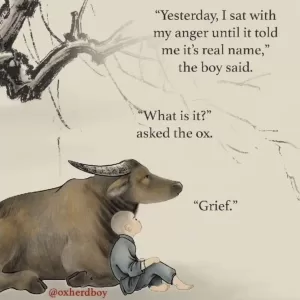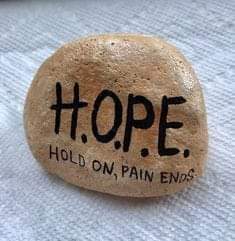EDITOR’S NOTE: Today is National Grief Awareness Day. I’m aware of grief every single day, especially so these last few years, and doing what I do, I see/hear alot about death and the “bad” news. When I talk about my grief with people I find that they share the same or similar feelings of a deep grief. Collectively humanity has endured many things and for our generation living through a pandemic and the ensuing political upheavals has great impacts. And as Christy Kay dives into deeper here, Western culture does not “deal” with grief. For our own well-being, we must change that paradigm. I find comfort and ease when talking about my grief as well as sharing others grief. As we age, grief hits differently and I find with each death or disappointment it can trigger the “old” grief. I acknowledge it, cry or rage, I talk about it with others, get outdoors … to the garden I go to find that peace. I’m lucky to have a tribe of people and the support to share these things. Grief awareness is every day so we can find our way to joy and love. Please join us as we continue the conversation. Share your experiences with grief and the ways toward hope. editor@tillamookcountypioneer.net
By Christy Kay
Grief is a word that means so many things and is different for everyone. The dictionary defines grief as “deep sorrow, especially that caused by someone’s death.” The emotional response to grief is not just sadness, or sorrow, as commonly believed. It includes feelings of anger, disbelief, pain, depression, and more- a whole range of feelings. Also, grief doesn’t just come from death of a loved one. It can be the loss of a job, a life you expected and wanted, or the end of a friendship. Although conventionally focused on the emotional response to loss, grief also has physical, cognitive, behavioral, social, cultural, spiritual, and philosophical dimensions. Grief is a multi- layered response to loss.
I have experienced many forms of grief in my life. I have been knocked down by it, sometimes nearly drowned in it, but I always found healing, rose back up, and found deeper joys. Because that’s the thing, isn’t it? When we surrender to emotions, allowing ourselves to feel them, they aren’t so big, and can move through us: the sadness, the sorrow, the grief. And then we are able to open to find strength, wisdom, and healing from these experiences. Grief is a singular experience; in that we all feel it differently. But it also is a collective experience because we all at one time or another have moved into a state of grief, have felt debilitating loss- as an individual, but also as a collective. We are all connected through energy. I’ve talked about this repeatedly in previous articles. Empath is a word that is used a lot lately. It means to pick up on another’s emotional state, which will often affect our own. It’s a scientifically proven experience of being human. When two or more are gathered, this is amplified.

So, let’s talk about the past few years of grief, as a collective. We have been ‘living’ through a pandemic, economic, racial, and social upset, and well, lots of chaos. We have lost millions of people to Covid deaths: these are our loved ones, our fathers, our mothers, our sister, our brothers, our friends, our community. We have been in survival mode much of the last three years and have not had time to process the grief of loss of loved ones, but also the loss of the lives we had created prior to the pandemic. Nothing is as it was, and it never was going to be, change happens constantly, it’s a law of nature. However, we have witnessed a rapid series of traumatic events in a very short time. And whether we choose to admit it or not, it has changed us, changed our lives. We also experience collective grief every time there is a mass shooting, especially when children are involved, like in a school shooting. Or it could be the loss of someone who is well-known and has affected many lives like Justice Ruth Bader Ginsberg, a hero to many women. In the last few years, grief has come to be a constant in our daily lives, in many forms, for many people. Grief can also include the loss of employment, or the loss of the ability to create the life you desire and wish for. It is the loss of hope, dreams, and vision for the future. Loss occurs in so many forms, and when we talk about grief, these other things often get overlooked. But it is grief, all the same. And it needs to be witnessed, expressed, and supported. Grief doesn’t just go away, over time, there is processing that needs to happen for true healing to occur.
We are individually and collectively carrying this huge weight of grief, all of us, and it’s a lot! And we are all, for the most part, trying to do it alone. This is mostly not a conscious choice. We have, in the history of humans in the Western world, been a people that pretend grief doesn’t exist. Psychologists and Sociologist will say we do this to protect ourselves from experiencing the pain and sadness that comes with grief- the if we ignore it, it can’t be real belief. Does it make rational sense? No. But this is what happens. Grief is something not talked about much, if at all. It seems we like to try to remove it from our lives, and our culture does not show us how to process it, to heal from it, or to witness it in others. When you experience a loss there is typically three days of support, that’s statistically the number of days people will reach out to you before they fade away, leaving you to mourn alone. It’s a crazy phenomenon. And once you’re “feeling better”, those people come back around again. We unconsciously believe that if we ignore it, it will go away, and perhaps we won’t all have to feel the pain of it. This causes more trauma and pain; in the isolation and loneliness we create for those experiencing grief. Grief needs to be witnessed to be healed. This is a true scientific fact, known by the medical field. When we ignore it, it is not witnessed, and it doesn’t heal. It becomes a worse pain. It grows and expands and becomes debilitating, often manifesting as physical pain.
There are several types of physical occurrences that can happen in a person who is moving through grief. Grief brain is a common phenomenon that shows up as lack of focus, memory issues and brain fog. Grief hair is also a common ailment that is a physical manifestation of the pain of grief, the stress of carrying grief alone, shows up as hair loss. Another common grief symptom that shows up physically is heart issues, literal heart attacks, and lung issues like lung cancer, or breast cancer in women.
 I know the pain of grief too well. Just in the last year, I lost 5 dear friends, and my father. It has been a year of “loss”, and grief is something I carry every day. It is a heavy weight upon the heart, that never really goes away. I resonate with the idea of it coming in waves, because that’s how it feels for me. Some days I can ride them, some days, I drown in them.
I know the pain of grief too well. Just in the last year, I lost 5 dear friends, and my father. It has been a year of “loss”, and grief is something I carry every day. It is a heavy weight upon the heart, that never really goes away. I resonate with the idea of it coming in waves, because that’s how it feels for me. Some days I can ride them, some days, I drown in them.
I had a friend come in the store recently and tell me that she wanted to acknowledge what she sees in my posts on Facebook, the grief I carry. She wanted me to know I was not alone. She told me of her own story of grief, the loss of both parents at a young age, the loss of friends recently, and the response from those around her. Her most frequent response was that it gets better, that it subsides, that it goes away. But it doesn’t, we just learn how to carry it better. Our hearts can either expand to create more room, or we close off and become angry and bitter, often from carrying the pain alone. I appreciated her connection and sharing of her own grief. It is helpful and supportive to know other’s stories, that we are not alone, especially in our grief. This is why I want to start a conversation about grief and grieving. Talking about it, witnessing it, is how we heal, individually and collectively.
We as a human collective might do better to be more aware and learn new ways to help each other through the pain of collective and individual grief. This doesn’t mean telling the bereaved that it is all for the best, or that things will be ok. These words are dismissive of the feelings that one is having in a normal response to loss. Often the best thing you can do is just sit and be with the person in pain, this is how we witness them. This is how we help them heal the deep wounds of loss. Ignoring and isolating those in grief creates more pain and grief. Allowing those in pain to move through their feelings in whatever way works for them, is how we help. Removing expectations of how we think grief should be and just opening to how they are and giving love for those in pain, is how we help. Sometimes it’s hugs, sometimes it’s sitting in silence, sometimes it’s cooking a meal, sometimes it’s caring for their kids so they can have some alone time. It’s different for everyone. If you know someone who has experienced loss and is grieving, ask them how you can help them. Often, you will hear them say, I don’t know. And that’s a valid response. Offer to sit with them in silence or ask them if they would like to talk about the loss. And just listen! That’s it. Don’t offer advice, or platitudes, or answers. Just listen.

Community caring is an important tenant of healing from grief and loss and should be an automatic practice for us all. I hope that the more we talk about grief and loss, the more we accept it as a part of the process of living. I hope that we can learn to support each other when going through these experiences, both collectively and individually, instead of isolating those suffering. And I hope that this happens soon, because it will always be a constant part of being human, something that we all have in common. We all need healing.
For more about healing and moving forward, contact Christy Kay at christy@cosmichealingnw.com

